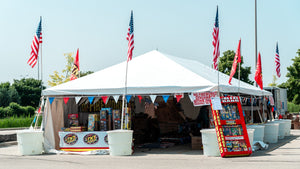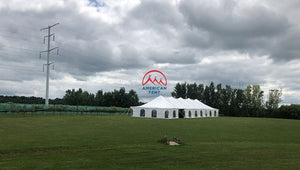With the unpredictable nature of outside forces, outdoor event planning can be quite an undertaking.
Not only does the event itself need to be planned, but extra preparations need to be put in place. You never know when a sunny day will become a rainstorm, or when a swarm of mosquitoes will descend.
Trying to think of every possible scenario to prepare for can be overwhelming, but don’t worry. The hard part is already done for you! We’ve compiled the best tips and everything you need to know on how to successfully plan an outdoor event. Keep reading for the full checklist!
Find a Great Place for the Event

Finding a suitable venue is an essential first step in planning your outdoor event. Different locations will come with different benefits and constraints you’ll have to plan to work around. Consider these factors when it comes to which location and/or venue space you’ll choose for your event:
- How much space do you need
If you are planning a large outdoor event, it can quickly become overcrowded if space isn’t an adequate size. Even a small outdoor gathering will be uncomfortable for guests if you don’t find a venue with enough space. If you can, visit your venue in person to visualize where things will go, and if it will be suitable for your needs.
- Utilities you’ll have access to
A venue in the middle of nature might be beautiful, but will it allow access to important utilities? Bathrooms, electricity, heating, and cooling are all essential to an amazing outdoor event your guests will enjoy. Ensure you’ll have the capacity to bring in utilities if your venue does not come fully equipped with the essentials.
- Shelter options
A beautiful outdoor event can be ruined by foul weather in a matter of minutes. Even if you’re planning an outdoor event in a temperate climate, having some shelter for guests is a good idea. You can find a venue with a pavilion or other structure, or you can always create your own. Event tents are a great choice for outdoor events that need a covered venue or backup shelter.
- Ease of access
Another reason viewing your outdoor event space in person is essential is to see how easy it is to get there. No matter how gorgeous the space, your guests won’t get to see it if they can’t find it or make the trek to get there. Ensure that your venue space is easy to get to, both for your guests and for the event setup.
Know the Rules of the Venue

Every event venue will have rules and regulations you must follow. Breaking them can result in hefty fees, or cancellation of your event altogether. Additionally, it’s important to know the local ordinances and regulations in the city of your event. You may even need to obtain special permits to legally throw your outdoor event.
Common outdoor venue regulations & important permits:
- City ordinances
Many cities have local ordinances barring loud music or other disruptions to residents late at night. If your event is in or near a residential area, you may have to keep the volume down at night.
- Temporary shelter restrictions
Check with your venue if you are planning on using an event tent or temporary shelter in their space. Some venues require extra insurance or high safety standards you must meet, and some may bar them completely.
- Catering rules
If you are planning on catering at your event, your venue may require you to work from an approved list. Some venues even restrict off-site catering and require you to cater your event food and drinks straight from them. Know your venue catering rules so you aren’t blindsided when you fall in love with a caterer you can’t use.
- Food permit
Any outdoor event serving food, for sale or not, will likely need a food permit to be legal. Ensure every vendor at your event has a food permit, and follows food preparation regulations.
- Alcohol permit
Like serving food, serving alcohol at your event may require a permit. You may also need special permission from your venue, as some will not allow alcohol even with a permit.
- Structure permit
Any event tent, temporary shelter, or structure comes with a risk of damage or injury if improperly installed. Because of this, many venues have strict safety regulations regarding any kind of temporary structure. You may need to acquire a structure permit for large stages, event tents, and more.
- Mass-gathering permit
If you are planning a large outdoor event with hundreds of guests, you may get a mass-gathering permit. This would likely be through the city of your event, rather than the actual venue.
- Electric permit
You may need a special permit to gain access to electric utilities for your event. It’s also quite common for venues to charge extra fees to access their electricity.
- Special effects permit
Fireworks and other pyrotechnics can make your event truly unforgettable but can be very dangerous. You’ll likely need additional insurance, licensed pyrotechnicians, and a special effects permit to have these at your event.
Prepare a Logistic Plan

Planning an outdoor event means coordinating and putting together a lot of moving parts. The behind-the-scenes details can quickly become overwhelming, so get your plan together well in advance. With the proper planning, all of your event setup, vendors, and staff can work together seamlessly.
Event logistics you should plan for:
- Event schedule
Having an event schedule planned and distributed to vendors and event staff is essential. Everyone will know when setup needs to be completed, and where they need to be at any given time.
- Setup plan
Your event setup plan should detail every step you can think of, so no one is left in the dark. This plan will help you determine the best order of operations to set up your event with no wasted time. It will also help your vendors and staff understand the order of operations and know exactly where they need to be at any given time.
- Emergency plan
With any outdoor event, unexpected circumstances are bound to occur. The weather may not cooperate, vendors or event staff may be unable to make it, and more. Creating a response plan for various emergency situations will allow the event to go on with a few tweaks.
- Contacts & important info
There will likely be many people from different places working to set up your outdoor event. Ensure everyone knows who they can contact if they encounter a problem in setup, or during the event.
- Medical services
Accidents happen, and injuries or illnesses may occur at your outdoor event. Make sure you have a plan in place to address any medical emergencies that may occur. This may mean simply having a first-aid kit for a small event, or a designated medical tent at a large event.
- Day-of communication
It can be difficult to communicate important information to vendors and staff while your event is happening. You’ll need a quick and effective way to communicate while everyone is busy setting up and providing a great experience for guests. Walkie-talkies can be a great solution for communicating with everyone at the same time.
- Security
Large events can quickly get out of hand and even be dangerous without proper security. Create a plan for security to carry out crowd control, emergency response, and escorting problematic guests off event grounds.
Let Your Event Be Accessible For Everyone

Everyone should be able to fully experience and enjoy your outdoor event, fully-abled or not. Not only is it a good ethical practice to make reasonable accommodations for those with disabilities - it’s the law.
The accommodations you’ll be expected to make will depend on your event size and guest count. Some of the most common accommodations include:
- Providing designated handicap parking in spaces closest to the venue entrance.
- Allowing access to service animals.
- Auxiliary aids like materials written in large-print or braille hired sign language interpreters and more.
- Break areas where service animals can go to the bathroom, and guests can take a break in a less stimulating environment.
- Clear walkways that are clear of hazards and accessible for guests using wheelchairs, scooters, or walkers.
Check The Weather

Weather can be unpredictable and you never know what’ll happen the day of your event, but you can still prepare. You’ll have a rough estimate for the temperature depending on the event date and location and can prepare with heating or cooling devices. You can also come well-prepared with an event tent to provide backup shelter if it ends up raining on the day.
Catering

Caterers need a lot of things in place to properly prepare, store and serve food to your event guests. They will need a space for their equipment, access to electricity to heat and cool food, water for sanitation, and more.
An experienced caterer should be able to tell you exactly what they’ll need and can offer advice on where to set up food stations at your event. Touch base with every caterer well in advance of the event to ensure they’ll have what they need.
Drinks

Don’t let your event guests go thirsty, or assume they will come prepared with their own drinks. They’ll be uncomfortable, likely upset, and even at risk for dehydration on a hot day. No matter how short your event is, ensure your guests have easy access to water, at the very least.
In the case that your venue space has access to public water fountains, make clear signage for guests. You can also let them know where water will be located ahead of time. If you’ll have to provide your own beverages, most caterers can help, or you can simply rent water coolers.
Check The Power

You’ll likely need a lot of power to put on your outdoor event. Heating and cooling, speakers and microphones, and catering equipment will all need industrial cable connections to power. Large cables and electrical equipment can be hazards for event guests, so ensure safety measures are in place. Keep electrical equipment covered from rain, well-secured, and taped down in areas guests will be walking.
Entertainment Preparation

A great venue with food and drinks is a great start to planning an outdoor event, but it’s not enough. Guests will quickly grow bored and might even leave early without enough to see or do. Ensure your guests are engaged and having a great time by providing event entertainment.
Outdoor event entertainment ideas:
- Face painting for kids
- Live music
- Movie screenings
- Carnival games
- Photo booths
- Live performers (dancers, magicians, etc.)
Amenities and Sanitation

Big or small, every outdoor event needs proper bathroom facilities and sanitary trash removal. If you are throwing your outdoor event somewhere with public bathrooms and trash cans, you won’t have to do much. Simply put a plan in place for picking up stray trash and emptying trash cans when they get full.
If you have to handle bathrooms and event sanitation on your own, here’s what you’ll have to keep in mind:
- Ease of access
When guests have to use the bathroom, they don’t want to walk 10 minutes to find one. Make sure your porta-potties are placed in a convenient location for your guests. Ensure your bathrooms are a quick walk away from the main attraction, on flat ground that’s easy to get to.
- Ventilation
Porta-potties must be properly ventilated to maintain the health and safety of your event guests. Vents will be necessary and can likely be acquired through your bathroom rental vendor. Just keep in mind that even the proper ventilation likely won’t keep your bathrooms from stinking. While you’ll want bathrooms in a convenient location, set them back enough that smell won’t become an issue.
- Quantity
Nothing is more frustrating than having to wait in a long line when you really have to go. Ensure your event guests will have proper access to bathroom facilities by ordering the proper amount. In most cases, 1 porta-potty for every 50 people should be adequate for your outdoor event.
- Sanitation throughout the event
Bathrooms get dirty throughout an event, and trash cans fill up fairly quickly. Have a plan in place to ensure everything stays clean throughout the night. You should have a few event staffers doing spot-cleaning throughout the event, and taking out the trash. This will cut down on smell and keep your event space spotless and enjoyable for guests.
- Guest sanitation
Finally, remember that your guests want to feel clean, too. Using a porta-potty isn’t the most enjoyable thing in the world, and can feel unsanitary. Help your guests stay clean by providing sanitation stations throughout your event. This can be as simple as hand sanitizer or wet wipes, or you can rent entire hand-washing stations.
Order Cleaning Company

Keeping your outdoor event clean can quickly become an overwhelming challenge at a large event. It is also a massive effort to clean up once your event has concluded. Planning your cleanup efforts ahead of time will save you time and additional venue fees if you don’t clean properly.
Ensure your event cleaning plan covers:
- Bathrooms
Bathrooms should be checked regularly throughout your event to be kept clean. Set a cleaning schedule for your staff so they know how often to spot clean restrooms.
- Trash pickup
Trash pickup should also be done throughout the event, not just at the end of the night. Ensure your staff is not only cleaning up trash on the ground but regularly taking out full trash cans.
- Hazardous material cleanup
Accidents happen at large events, and your cleanup crew may have to clean up vomit, blood, or more. It’s important your staff is properly trained on how to clean hazardous materials to keep themselves and event guests safe.
- Event tear-down
Don’t skimp on hiring staff for your tear-down efforts once your event is over. This can be a massive undertaking, and you’ll likely face hefty venue fees if you don’t clean up properly.
Pest Control

Enjoying the great outdoors is a huge perk of any outdoor event, but pesky bugs are not. Have a plan in place so your guests aren’t swarmed by mosquitoes or swatting flies from food. While you can’t ensure a few bugs won’t get in here or there, these steps can help:
- Incorporate citronella candles
- Keep your space cool and ventilated
- Use sugar water and fly traps
- Cover food when sitting out
- Rent sidewalls for your event tent
Have a Backup Plan

No amount of planning can save you from everything that could go wrong at an outdoor event. Your event could get rained out, a caterer could cancel last-minute, and so on. It’s always good to have a backup plan for as many facets of your event as possible.
Have an event tent or other temporary shelter in place and on-hand, in case the weather doesn’t cooperate. Create a list of backup vendors who can step in if someone has to cancel. Utilize an additional event coordinator to handle any little mishaps along the way. By planning for unpredictable circumstances, you’ll be ready when they happen.
Event Planning Checklist for an Outdoor Event
This outdoor event planning checklist is free for you to download. Saving and following this list will ensure you have everything you need for your event.
Conclusion
Planning an outdoor event is quite the undertaking, but your hard work will pay off with an amazing event! This checklist will ensure that you won’t forget a thing when it comes to planning your event. At American Tent, we are passionate about helping people plan amazing outdoor events. Check out our blog for more event planning resources, and find the perfect shelter for your event.







